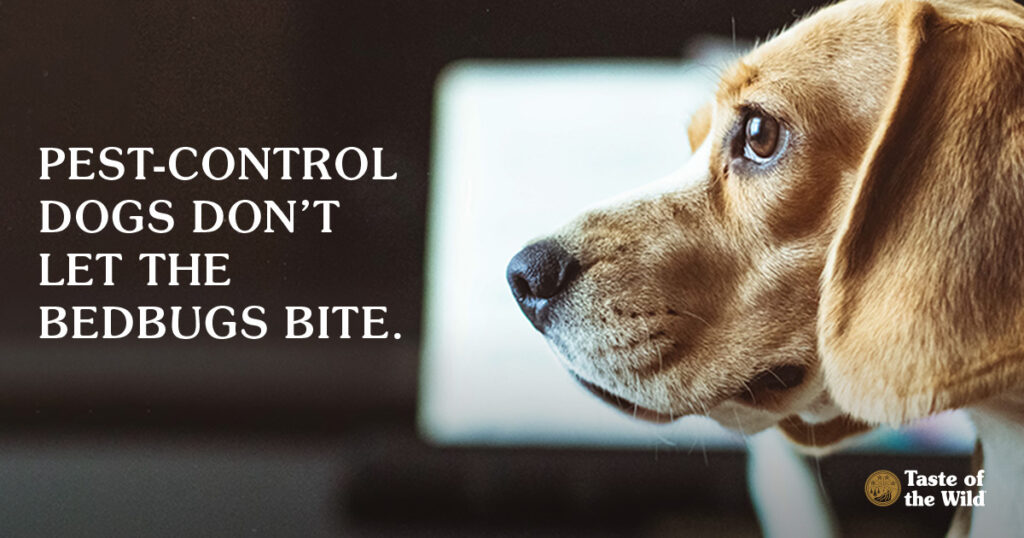
When your dog peers under the kitchen stove growling for hours, you can be pretty sure there’s some kind of varmint hiding under there. If you’re lucky, your pet comes with these pest-hunting skills naturally and will chase the unwelcome critter off.
Some dogs, however, are specially trained to hone their hunting skills on vermin of the six-legged sort. If scent-detection dogs can be trained to sniff out bombs, drugs and even cancer, why not termites and bed bugs?
Can Dogs Smell Termites?
Hungry termites can cause devastating damage to homes. Because termites are usually tucked behind drywall and plaster, they can’t always be detected until they’ve caused a tremendous amount of damage.
Termite dogs to the rescue! These pups can be trained to sense the methane emitted by termites as they digest wood in a particular area. So they’re often able to locate infestations well before human inspectors can. In studies, trained dogs were able to detect termite groups of 40 or more with about 95 percent accuracy. If that’s not impressive enough, the research showed that they could even discriminate between live termites and wood that had been previously damaged by termites, as well as cockroaches and ants.
When matched against electronic detection devices, canine inspections win by a long shot with an average of 98 percent accuracy.
Can Dogs Sniff Out Bed Bugs?
Bed bugs (Cimex lectularius) are the bane of hotels, apartments, dorms, cruise ships and other places that offer temporary housing. While they don’t transmit disease, they do feed on the blood of people and humans while they sleep, which can cause itching, inflammation and general revulsion. In rare cases, people can have an allergic reaction when bed bugs bite.
Unfortunately, bed bugs are not only tiny and nocturnal, but they can be experts at hiding inside mattress seams, in bed frames and box springs, behind baseboard cracks and crevices and even under light-switch covers. Thankfully, dogs can be trained to sniff out these tiny invaders, too.
In studies, trained bed bug dogs were able to sniff out live bed bugs and live bed bug eggs with 100% accuracy. They can even distinguish between dead bed bugs and live ones! However, several pest control businesses have been reported for using canine bed bug inspection methods to find a bed bug infestation that wasn’t, in fact, there when another business checked the premises. People requesting bed bug inspections with trained bug-sniffing dogs should always ask the handler for the dog’s credentials. Honest, professional companies will be happy to show their proof of training.
That way, you don’t get bitten twice.
How Do You Know if You Should Worry About Bed Bugs?
The signs that you might have a bed bug problem are subtle. The bugs are active at night and are small — about the size of an apple seed — flat and red to rust-colored, depending on how recently they have fed. You might see shed exoskeletons, the black dots of bed bug feces, or blood spots on your bed. Bed bugs feed on their hosts only for about 5 minutes before dropping off and hiding again, so you’re more likely to be aware of the bites than the bugs. The bites look like one or a line of red welts that could be mistaken for mosquito bites.
Do Bed Bugs Bite Dogs?
So wait — do you need to worry about bed bugs biting your furry friend?
If the household dogs and cats are itching, and you’re not, flea bites are the more likely culprit. Bed bugs feed on the blood of any warm-blooded creature, but fortunately for our pets, their fur makes them less attractive targets for bites. If you think you’ve got an infestation, though, be sure a pest control company treats any areas of the house where your pets spend time. Itchy bites are a drag, but at least bed bugs don’t transmit diseases the way other insect pests like fleas, ticks and mosquitoes can.
Can Bed Bugs Live on Dogs?
Unlike some bugs, these pests don’t live on their hosts. Our pets’ furry coats aren’t considered reliable hiding places by bed bugs. They could lay eggs or hide in your dog’s bed (or more likely your bed), however. So the solution is a hot water laundry run instead of specialized combs or shampoos.
Help! We Have Bed Bugs — Now What Do We Do?
Eradicating bed bugs from your property is a challenge because they’re good at hiding. Effective bed bug treatment needs to address all of their hiding places: all the furniture in the affected room (not just the bed) and even luggage (especially if you’ve been on a trip recently). You may need to call pest control experts for bed bug control. They might bring canines trained to recognize the specific scents and pheromones for their bed bug inspection, or they might rely on physical signs to identify the targets for treatment. They’ll have the pesticides necessary to control the bugs and the eggs — the chemicals in over-the-counter flea extermination bombs frequently don’t kill bed bugs. Don’t forget to treat the places your animals sleep, but let those items air out before nighttime.
Once you catch on that these aren’t your usual bug bites, that’s the first step in making sure that your bed is a comfy haven again. And it’s nice to know that our furry companions are among those who help us keep it that way.

